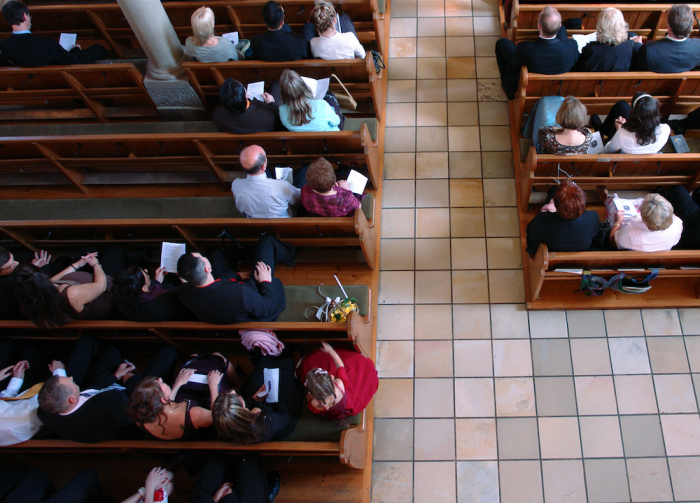A third of Americans say they attend religious services at least once per month, survey finds
Most Americans believe country would be better if more attended services

Amid growing concerns of religious decline in the United States, a recent survey suggests a growing share of American adults consider themselves religious although one-third say they attend religious services at least once per month.
On Tuesday, Rasmussen Reports released a national survey of 1,155 U.S. adults, finding that 69% of American adults consider themselves religious, with 24% saying they're very religious. The finding is higher than a survey Rasmussen conducted in June 2021, in which 57% considered themselves religious.
The survey was conducted online and by phone from Sept. 20 to Sept. 21, with the margin of sampling error at +/- 3 percentage points with a 95% confidence level.
When asked how crucial religion is in their daily lives, 61% of participants said that religion was important, and 31% said it was very important. In a December 2018 poll, 71% said faith was important to their daily lives.
Forty-one percent of all respondents reported they rarely or never attend services at a church, synagogue or mosque. Fifteen percent said they attend religious services weekly, with 6% saying they attend at least once a month.
Another 7% of participants said they attend religious services once or twice a month, and 6% said they'll go more than once per week. Twenty-one percent said they occasionally attend services.
Republicans (29%) and those unaffiliated with any major party (19%) said they attend religious services at least weekly, compared to 16% of Democrats. Forty-five percent of Democrats said they rarely or never attend services, in contrast to 44% of unaffiliated respondents and 31% of Republicans.
Only 9% of Republicans said they are not religious, compared to 23% of Democrats and 26% of unaffiliated voters.
Forty-two percent of respondents said they think the U.S. would be better off if more people attended religious services on a regular basis, and 30% said it wouldn't make a difference. Another 13% claim more Americans attending services more often would make the country worse, while 15% said they weren't sure.
Thirty-six percent of Democrats agreed with the 65% of Republicans who believe the country would benefit from more people attending religious services regularly. Thirty percent of people unaffiliated with either party said the same thing.
Women (33%) were more likely than men (29%) to say that their faith is very important in their lives. However, men (45%), more so than women (40%), think that people attending religious services on a regular basis would make the country a better place.
Marriage appears to impact how much Americans value religion, as married participants were likelier than non-married respondents to say they consider themselves very religious.
Race also played a factor, as 49% of blacks compared to 29% of whites and other minorities said faith is very important in their lives.
Voters 65 and older were the most likely to claim that they're very religious and that America would be a better country if more attended religious services on a regular basis.
According to a September analysis by Pew Research Center, if the rate of Christians abandoning their faith before they turn 30 accelerates beyond its current pace, America could no longer be a majority Christian country by 2045.
"Of course, it is possible that events outside the study's model — such as war, economic depression, climate crisis, changing immigration patterns or religious innovations — could reverse current religious switching trends, leading to a revival of Christianity in the United States," the researchers noted.
"But there are no current switching patterns in the U.S. that can be factored into the mathematical models to project such a result."
A survey released earlier this year by the American Bible Society suggests that two-thirds of Generation Z and Millennials who say they have made a personal commitment to Christ do not attend church in person or online at least once per month. Additionally, 40% of Generation Z adults ages 18 and over attend church "primarily online."
"This should challenge every Christian and ministry leader to intentionally cultivate relationships with their younger neighbors, who are often seeking security and hope amidst ever-increasing anxiety," said John Farquhar Plake, director of ministry intelligence for the American Bible Society. "It's our prayer that every generation is able to meaningfully connect with the Word of God, engaging with it as a way of life and actively living out their faith in community."




























